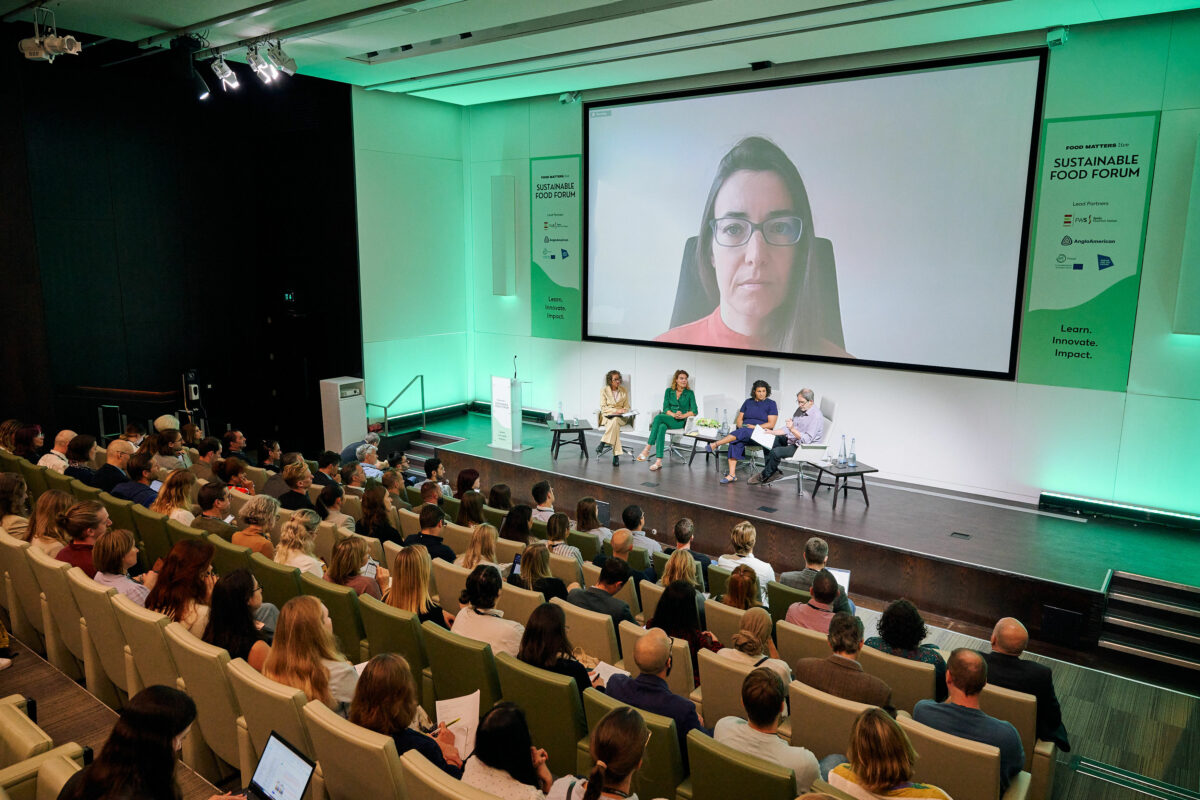10 key trends in sustainable food

Ensuring that the food system becomes truly sustainable is no longer an option. In the midst of a climate crisis and with the global population predicted to increase by two billion in the next 30 years, feeding the world, achieving food security and reversing the damage done to the environment is now paramount if we want to avert an irreparable crisis. The F&B industry gathered at Food Matters Live’s Sustainable Food Forum on 19-20 September to discuss the challenges faced by the sector, and highlighted 10 key trends in sustainable food that must be adopted swiftly to protect the health of people and the planet.
Collaboration
Collaboration between companies, in particular nascent, disrupting sectors such as plant-based, precision fermentation and new ingredient production, was key for many speakers at Food Matters Live’s Sustainable Food Forum.
Speaking on the We become what we eat, and so does the planet: changing global diets panel at the Forum, Edwin Bark, Senior Vice President of plant-based meat company Redefine Meat, emphasised the urgency and importance of collaboration in order to scale up alternative protein start-ups and compete with meat and dairy companies.
Soil health and the role of farmers in sustainable agriculture
The need to restore soil health and work directly with farmers was echoed by several speakers at the Sustainable Food Forum. Kayhan Atalay, Head of Marketing at multinational mining and fertiliser company Anglo American spoke about soil degradation and how the land we grow food on today is not the same as it was 1000 years ago.
Intensive farming and chemical fertilisers have had an extremely negative impact on soil, decreasing its health and production. Atalay stressed that we must find a solution to produce food whilst protecting soil, and added that farmers must be helped and supported if we wnat to improve food production whilst protecting the ecosystem. For the Anglo American Head of Marketing, it’s not possible to meet sustainability goals within the current fossil fuel system and we must do more to promote regenerative agriculture and traceability.
Angela Francis, Chief Advisor Economics and Economic Development at WWF, who spoke on the The future of food: how to transform the global food production system, also highlighted the importance of making sure that farmers are part of the conversation and are giving the support they need, in particular in developing countries.
The Sustainable Food Trust’s Fabia Bromovsky highlighted the need for a holistic approach in farming, the importance of restoring the health of the soil’s microbiome and educating consumers about where food comes from. Whilst Bromovsky believes that livestock helps nature’s ecosystem, she added that animal agriculture needs rebalancing and levels of meat consumption must decrease.
Nature-based solution and consumer demand in sustainable packaging
Speaking on the Innovation in sustainable packaging panel at Food Matters Live’s Sustainable Food Forum, Hoa Doan, Head of Impact and Sustainability at natural packaging solution start-up NotPla, highlighted two key trends in the sector.
Nature-based solution alternatives are key to reduce the use of plastic. With legislation in the EU and UK implemented to ban single use plastic and the UN Global Treaty, which states the need to phase out plastic packaging, alternative materials such seaweed and plants used in NotPla’s products are now more important than ever. Consumers are educating themselves about plastic pollution, care about food packaging and are demanding environmentally-friendly solutions.
Food brands are showing an interest in the start-up’s eco and compostable solutions and are approaching NotPla in order to work collaboratively and find alternatives to plastic for their packaging solutions. Just as many other companies, NotPla believe that collaboration with food producers is key to reduce plastic pollution.
This sector is however not without its challenges. Whilst NotPla has a wide range of solutions to replace plastic in packaging, costs are still a barrier. Doan highlighted the need of scaling to drive down prices. Collaborating with food brands and raising awareness of problems but also solutions, having a seat at the table and myth busting, are all key to promote and adopt alternatives to plastic in food packaging, she said.
Price parity between plant-based and animal products
Many speakers at the Sustainable Food Forum were vocal about the discrepancies between meat and dairy subsidies and plant-based ones.
Activist and environmentalist Jonathon Porritt, who also took part in the The future of food: how to transform the global food production system panel, pointed out that the UK and US spend 1200 times more to promote meat and dairy than plant-based alternatives, and that stakeholders in the animal agriculture sector have no intention of giving up the huge governmental financing they receives.
Edwin Bark and Alberto Musacchio, CEO of meat analogue company Food Evolution, also pointed out the need for the plant-based industry to receive more substantial financial help from governments in order to better compete with meat and dairy companies, scale their businesses and invest in R&D.
Ultimately, financing one of the largest producers of GHG emissions will not only mean that countries will not meet the sustainability targets set out by the Paris Agreement, it will also be an environmental and human disaster.
Investment in local food ecosystem and crops
Developing countries must start to grow their indigenous crops – rather than those dictated by western countries – to ensure food security. Ndidi Okonkwo Nwuneli, LEAP Africa board member, co-founder and Executive Chair of Sahel Consulting Agriculture and Nutrition, and AACE Foods Processing & Distribution Ltd, was clear in her message at the Forum: we need to change the face of Africa by working with local SMEs to transform the continent’s food ecosystem and by providing nutritious and sustainable food that’s affordable, acceptable, convenient and available to all.
Okonkwo Nwuneli advocates for planting and harvesting indigenous crops that are almost forgotten, such as teff, investing in local food ecosystems and empowering the players in the field.
Dr Fabrice DeClerk, Science Director at NGO EAT also stressed the importance of promoting agricultural diversity and harvesting indigenous crops, as well as ditching the typical western diet, which is high in sugar, salt, fat and red meat, and embracing healthier cuisines, as well as consuming more vegetables, fruit and nuts.
Data and information sharing
The use of quality data sets to map the food system has been talked about for some time, yet reporting on sustainability at this stage is very much voluntary. Clear, standardised KPIs and data sets should be defined, transparent and shared across the board in the food industry, rather than individual companies being left to decide how they measure their sustainability goals. This concept was highlighted by Zbigniew Lewicki, Chief R&D, Sustainability & Operations Officer, Beverages Division at Unilever, and echoed by many at the Forum.
Utilising food waste to create new ingredients
Cutting down food waste by using all parts of certain types of produce, for instance the cocoa bean, is an efficient way to minimise waste, as highlighted by IFF’s Global Innovation Programme Director Eve Martinet-Bareau. This of course presents some challenges, which could be tackled with the right technology.
Scaling down animal agriculture
Whilst for some animal agriculture should be eradicated altogether, for many the starting point is to scale it down. Currently humans are eating vast amounts of meat, which not only takes a huge toll on the environment, but also on human health.
Plant-based meat that tastes like animal meat
Making plant-based meat appealing to omnivores and flexitarians was a key trend at Food Matters Live’s Sustainable Food Forum. In the words of Redefine Meat’s Senior Vice President Edwin Bark, “We love meat, we just don’t think it should come from animals.“ The challenge for plant-based companies is to get the flavour, mouthfeel, texture, and of course, price point, right, so that meat eaters don’t feel like they are missing out when they eat an alternative protein product.
Shift in food production and consumption
We not only need to make a shift in food production to ensure sustainability, but consumers must use their spending power to make mindful and conscious choices that have minimal impact on the environment. Supply and demand must become eco-responsible, a concept expressed by Food Valley’s CEO Marjolein A.J. Brasz at the Forum, and echoed by many other speakers and attendees.









